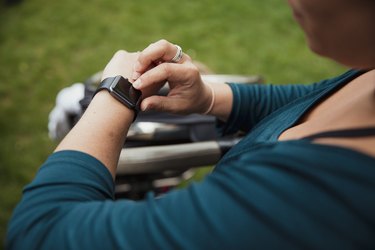
If you're trying to be more active to improve your health or lose weight, counting steps provides you with a measurable, motivational goal. Plus, all you need to get started are comfortable shoes and a pedometer.
But it's not always easy to know exactly how many calories you burn in 12,000 steps. It depends on a couple of factors, including your weight and how fast you're going.
Video of the Day
Video of the Day
How Many Miles Is 12,000 Steps?
Your stride length varies depending on your height, but in general, it takes around 2,000 steps to walk one mile. That means 12,000 steps is roughly 6 miles.
Shorter people may cover less distance in 12,000 steps, while taller folks may travel farther in 12,000 steps. And if you're moving faster, like jogging or running, you might cover a mile in fewer steps, according to the American College of Sports Medicine.
How Many Calories Do You Burn in 12,000 Steps?
If you figure out how many calories you burn per mile, you can do some simple math for how many you burn in 6 miles.
Here's what that looks like for a few different body weights at 4 miles per hour, or 15-minute miles, according to Harvard Health Publishing. Remember, these are rough estimates — calorie burn is different for different people based on a number of factors (more on that below). But in general, walking 12,000 steps can burn around 400 to 600 calories.
Calories Burned in 12,000 Steps
Body Weight in Lbs. | Speed in mph | Calories Burned in 12,000 Steps |
|---|---|---|
125 | 4 | 405 |
155 | 4 | 525 |
185 | 4 | 567 |
Factors That Affect Calorie Burn
As mentioned above, calorie burn varies. Factors that help determine how many calories you burn in 12,000 steps include:
- Your height and stride length
- Your weight
- How fast you're walking
- The intensity of your effort
- If you're walking on flat ground, hills or stairs
Tip
Fitness trackers and apps can help you estimate your calorie burn based on the factors above. You can also talk to a trusted health care professional about creating a fitness routine that works best for you.
Walking for Weight Loss
If you're trying to lose weight, burning calories by counting steps may help. A 2008 meta-analysis in the Annals of Family Medicine investigated the effects of participating in a pedometer-based walking program on weight loss. Even without making changes to their diet, regular pedometer users were able to lose 1 pound every 10 weeks, or about 5 pounds in a year.
But you don't have to aim for 12,000 — or even 10,000 — steps every day. A May 2019 study in JAMA Internal Medicine found as few as 4,400 steps daily was associated with longer life among older women compared to women who were more sedentary. And while the researchers noted more benefits as step counts went up, the perks leveled off at about 7,500 steps a day.
Is 12,000 Steps a Day Enough Exercise?
It certainly can be, as long as some of those steps are at a moderate intensity. Aim to meet the daily activity recommendations set forth by the U.S. Department of Health and Human Services. For good health, adults should get at least 30 minutes of moderate-intensity activity five days a week, plus two days of strength training, according to the Physical Activity Guidelines for Americans.
Moderate-intensity exercise should get your heart pumping at about 50 to 70 percent of your maximum heart rate. You should start to lose your breath and break a sweat but still be able to talk to a workout buddy and sustain this effort for a while (if you had to!).
How to Get the Most Out of Your Walks
The health benefits of walking go far beyond calorie burn. A regular walking routine has been linked to improvements in mood, sleep, blood pressure, pain, immune health and more. But when you're walking for fitness or trying to increase your daily step count, you can keep these tips in mind for burning more calories and maximizing your walking routine:
- Pace the bathroom while you brush your teeth.
- Walk around the kitchen while your coffee brews.
- Park at the far end of parking lots.
- Take the stairs instead of elevators or escalators whenever you can.
- Walk during phone calls.
- Walk up hills or on an incline on the treadmill.
- Try interval walking workouts: Walk at a faster pace for 30 seconds, then a comfortable pace for 30 seconds, and repeat.
- Harvard Health Publications: "Calories Burned in 30 Minutes for People of Three Different Weights"
- Annals of Family Medicine: "A Meta-Analysis of Pedometer-Based Walking Interventions and Weight Loss"
- JAMA Internal Medicine: "Association of Step Volume and Intensity With All-Cause Mortality in Older Women"
- HHS: "Physical Activity Guidelines for Americans 2nd edition"
- ACSM's Health & Fitness Journal: "ONE-MILE STEP COUNT AT WALKING AND RUNNING SPEEDS"




